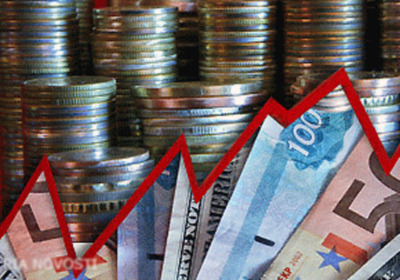Russian Options Narrow as Putin Looks to Exporters’ Windfall

(Bloomberg – bloomberg.com – Olga Tanas, Andrey Biryukov – September 22, 2015)
Russian President Vladimir Putin’s promises made as recently as last year may be the latest casualty of the collapse in oil prices.
Putin instructed the government on Tuesday to study the possibility of steering into the budget some of the gains by exporters from ruble devaluation, without losing the focus on meeting all social obligations. One proposal has been to raise taxes on crude producers, the nation’s main source of revenue, a move that would break the president’s pledge to refrain from higher levies.
“It’s necessary to ensure that state finances are balanced and steady,” Putin said at the meeting with top officials near Moscow. “The situation in the economy isn’t simple, but it’s not critical. We have to make calibrated, correct decisions aimed at strengthening the country’s economic potential.”
The budget debate is putting the spotlight on an economy cratered by a selloff in oil, which has paralyzed investment and plunged millions into poverty amid the biggest collapse in living standards during Putin’s 15 years in power. With Russia at threat of the longest recession in two decades, the government is struggling to find the right policy mix after responding this year with budget cutbacks and a stimulus program for banks and industry.
Foreign Revenue
After appealing to exporters to sell foreign currency at the height of last year’s currency crisis, the government is zeroing in again on companies that have been among the biggest beneficiaries of the ruble’s tumble of more than 50 percent since the start of 2014, the steepest decline since the 1998 economic crisis.
Under discussion is a proposal to raise levies on the oil industry, which may generate an additional 605 billion rubles ($9.1 billion) for next year’s budget, Finance Minister Anton Siluanov said Tuesday. Other options for stabilizing government finances include spending cuts and changes in the pace of increases for state-regulated tariffs.
Elections Loom
As economic pressures build, Russia is also bracing for early parliamentary elections next year and the presidential vote in 2018. While Putin is still riding a wave of patriotic support linked to the standoff in Ukraine, with approval ratings hovering above 80 percent, gauges of social sentiment are declining. Optimism regarding Russia’s prospects has plunged near a level last seen in 2009, according to a survey published Monday by the state-run All-Russia Center for the Study of Public Opinion.
“It’s very important now to adapt the budget to the new reality, with the lower oil price and lower oil and gas revenues in the mid-term,” said Oleg Kouzmin, a former central bank adviser who’s now an economist at Renaissance Capital in Moscow. “The sooner they will start to do that, the more opportunities there will be to implement the necessary steps smoothly, with fewer costs for the economy and risks for the budget system.”
Brent crude, used to price Russia’s main export blend Urals, decreased as much 2.25 percent to $47.82 a barrel on the London-based ICE Futures Europe exchange. The ruble traded 0.8 percent weaker at 66.49 versus the dollar as of 5:53 p.m. in Moscow.
Fiscal Adjustments
The government, which relies on oil and gas for almost half of its revenue, is drafting next year’s budget based on an average price of Urals at $50 a barrel. It’s already revamped its approach by shortening its fiscal-planning horizon to one year, from three, for 2016 and suspending a rule that capped public spending based on average long-term oil prices.
The Finance Ministry has also suggested further decreases to spending, including a reduction in pension adjustments to 4 percent. Next year’s fiscal gap must not exceed 3 percent of gross domestic product, Putin said at the meeting. While telling the government to consider using some of the revenue reaped by exporters as a result of the ruble devaluation, the president warned against undermining the companies and their investment capabilities.
“It’s necessary to act extremely carefully,” he said.
There’s still no final decision on tapping into exporters’ revenue because of concern by the Energy Ministry about the damage such a move may inflict on corporate investment programs, Siluanov told reporters after the meeting.
By targeting the oil industry, the Finance Ministry may end up making cuts in expenditure more palatable, according to Alexey Pogorelov, an economist at Credit Suisse Group AG. The new deadline for submitting the budget to lawmakers is Oct. 25.
“The option with the extraction tax was presented on purpose,” he said. “This initiative would not be supported by the oil and gas lobby and the government may back alternative proposals of the Finance Ministry to cut spending.”
Article ©2015 Bloomberg L.P. All Rights Reserved. Article also appeared at bloomberg.com/news/articles/2015-09-22/russia-running-out-of-options-as-putin-discusses-budget-for-2016
